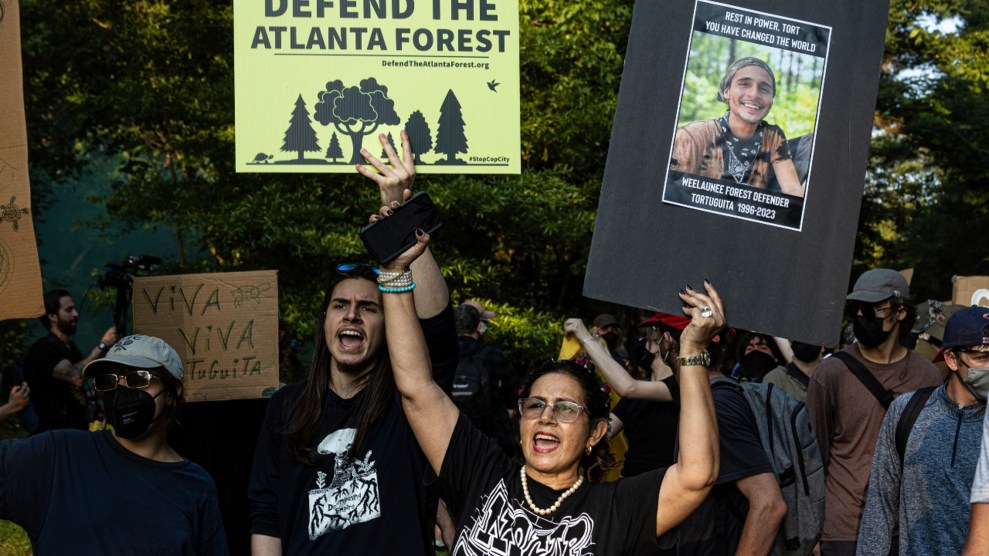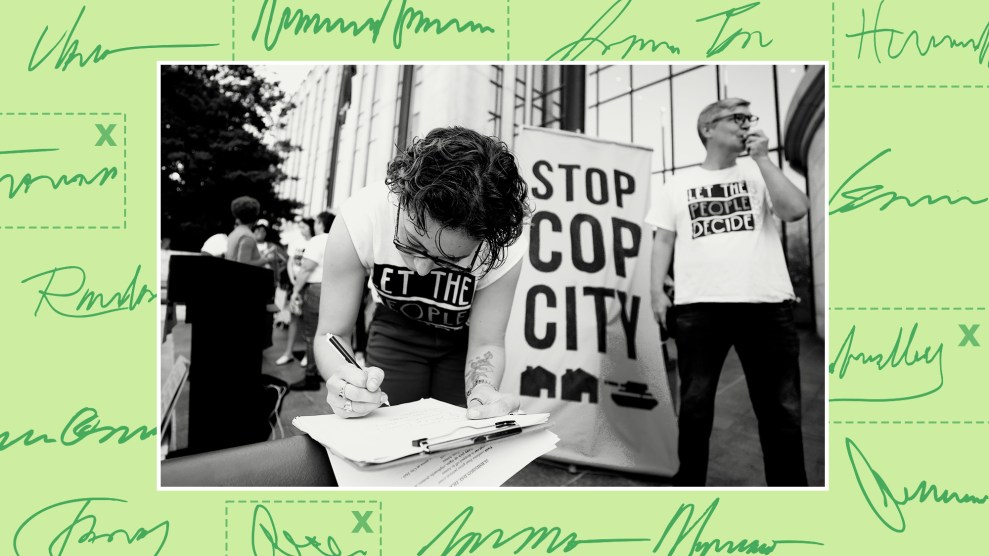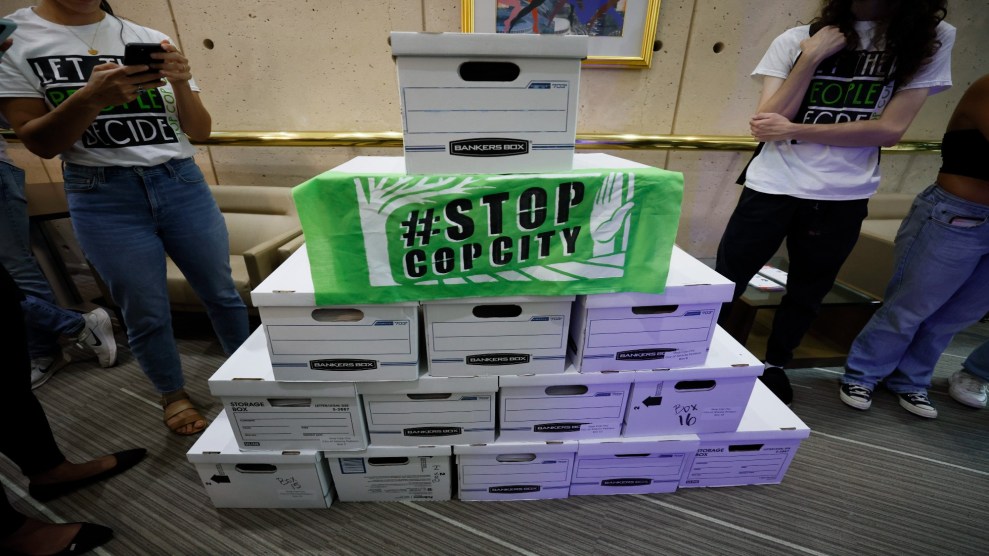In 2021, when Keisha Lance Bottoms, then Atlanta’s mayor, revealed plans for a new $90 million police training facility, she told the Atlanta Journal-Constitution that the project was essential “if we want the best, most well-trained officers protecting our communities.” Its classrooms, shooting range, and simulated city streetscapes would, according to the project’s website, help law enforcement “learn de-escalation and harm reduction techniques that reduce the use of force.”
But some Atlantans who had taken to the streets for the previous year’s demonstrations over the police murder of George Floyd didn’t think Atlanta needed any more cops—no matter how well trained. Protesters quickly mobilized against the project, dubbing it “Cop City” and describing it in very different terms. The facility would “allow police not just from Atlanta, but globally, to learn repressive tactics, so that protests and rebellions can be easily crushed,” warned the American Friends Service Committee. Other critics worry about the environmental impact of the facility—the woods for its proposed location are one of four forests called the “lungs of Atlanta.” Nonetheless, the construction began, with the first phase set to open two years later.
Then, in 2023, Georgia state troopers killed Manuel Esteban Paez Terán, an activist known as Tortuguita, who had taken up residence at the planned facility’s wooded site hoping to block construction. Outraged by Tortuguita’s death, organizers supercharged efforts to put the project up for a voter referendum in the fall. More radical protesters allegedly have damaged construction equipment and thrown rocks and Molotov cocktails at police cars; 42 are currently facing state domestic terrorism charges. In August, 61 opponents of the project were indicted under Georgia’s RICO law—the same broad anti-racketeering measure behind Trump’s Fulton county election interference case.
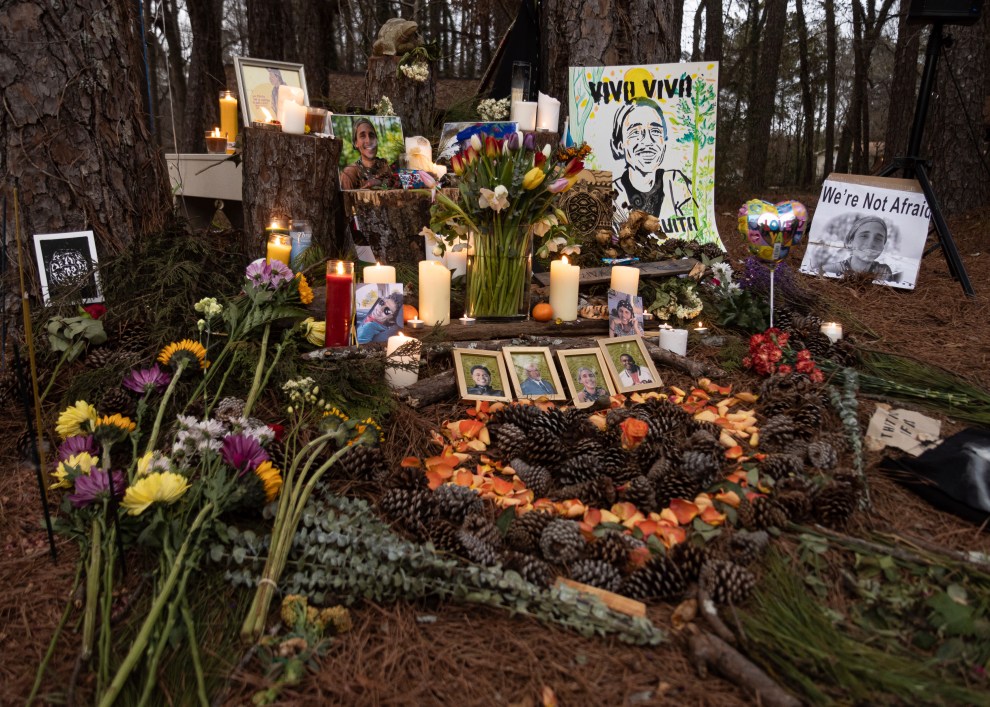
A vigil in Atlanta commemorating the life of environmental activist Manuel “Tortuguita” Terán on January 18, 2024. Tortuguita was killed by Georgia state troopers a year before, on January 18, 2023, during a raid on a Stop Cop City encampment.
Collin Mayfield/Sipa/AP
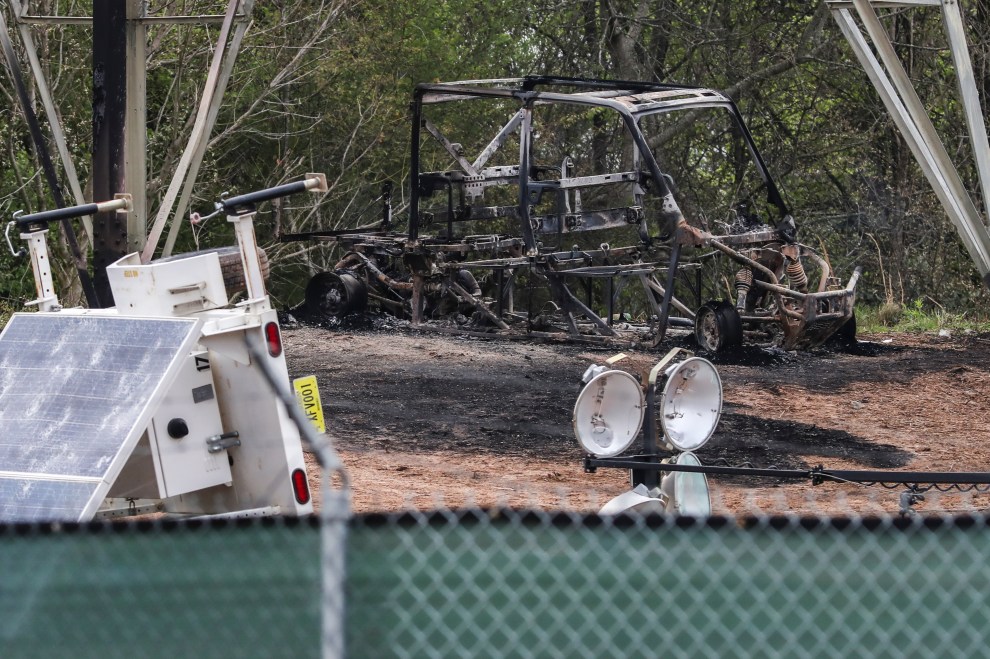
Damaged equipment sits at the Atlanta Public Safety Training Center in DeKalb County, on March 6, 2023.
John Spink/Atlanta Journal-Constitution/AP
The protesters, meanwhile, have doubled down, sending teams out to collect signatures for the ballot measure, chartering buses to pack events, and hiring lawyers to defend those facing charges. This kind of activism doesn’t come cheap—but luckily for the protesters, they have a deep-pocketed ally: Fergie Chambers, a 39-year-old self-proclaimed communist with a net worth in the hundreds of millions of dollars. Chambers’ wealth comes from his father’s family’s company, Cox Enterprises, a global conglomerate with automotive and media holdings, including AutoTrader, Kelley Blue Book, Cox TV, the political site Axios, and the Atlanta Journal-Constitution. With a fortune of some $26.8 billion, the Cox family, a powerful force in Atlanta philanthropy, made the second-largest contribution in 2022 toward the training facility, with their foundation providing $10 million of a planned $60 million in private funding. (Georgia taxpayers are putting up $31 million.)
In contrast, Chambers estimates he’s donated “a couple million dollars” in the last year to groups opposing the very facility that high-profile members of his family want to be built. Not only has he financially supported signature gathering for the referendum, he’s sponsored buses to shuttle protesters to the site, and contributed “hundreds of thousands of dollars” to funds that paid for bail and lawyers for those who had been arrested.
While the broader Cox family’s political reputation is squarely centrist, Chambers’ is somewhere in the vicinity of Chairman Mao. When we spoke—after a few weeks of phone tag that involved me missing some pre-dawn calls back from Chambers—he seemed to relish defying mainstream orthodoxy, calling Russian President Vladimir Putin “one of the better statesmen of our century,” and describing Hamas’ October 7 attack as “a moment of hope and inspiration for tens of millions of people.” While he denies a recent claim in Los Angeles Magazine that he chants “death to America” every day, he allows that the idea is more or less true. “I think the most important thing for the prosperity of humanity is the destruction of the US,” he told me.
Because of these extremist views, Chambers’ generous funding of Cop City protests has repercussions beyond the training facility itself. Some Atlanta Democrats worry that his views, along with what they see as increasingly belligerent tactics by the protesters he funds, could alienate the suburban voters who helped Georgia flip the Senate blue in 2020. A poll last year showed that a majority of the state’s voters—and 43 percent of Democrats—support the facility.
Last fall, former Rep. Carolyn Bourdeaux, a Democrat who represented a metro Atlanta district from 2021 to 2023, wrote an op-ed in the Journal-Constitution: “Certainly, from my suburban vantage point, it looks like downtown progressive activists, supported and funded by national activists and donors, are going crazy over a well-intentioned effort,” she wrote. When I spoke with her, she said she worried that property-destroying protesters were a bad look. “No one should be subjected to police brutality—hard stop,” she wrote to me in an email. But “most moderate Democratic voters of my acquaintance don’t even understand why on earth this facility would generate such ferocious protest…better training would seem to be a solution to problem of police brutality.”
Bill Torpy, a veteran columnist for the Journal-Constitution, put a finer point on it: The “kind of rhetoric” from the most strident protesters, he said, “is something that might get Trump reelected.”
But opponents of the facility I spoke with dismissed those concerns. “I think it’s a good thing that Cop City is causing increased polarization and fracturing amongst Democrats and so-called progressive politicians” who are “more concerned with their bank accounts than they are with doing what is actually right,” argued Sam Beard, an organizer of a group called Block Cop City. Similarly, veteran Atlanta organizer Kamau Franklin told me he thinks the facility “should be a wedge issue because establishment Democrats have not sided with the people when it comes to issues of cops and capitalism. Establishment Democrats are on the same side as right-wing Republicans.”
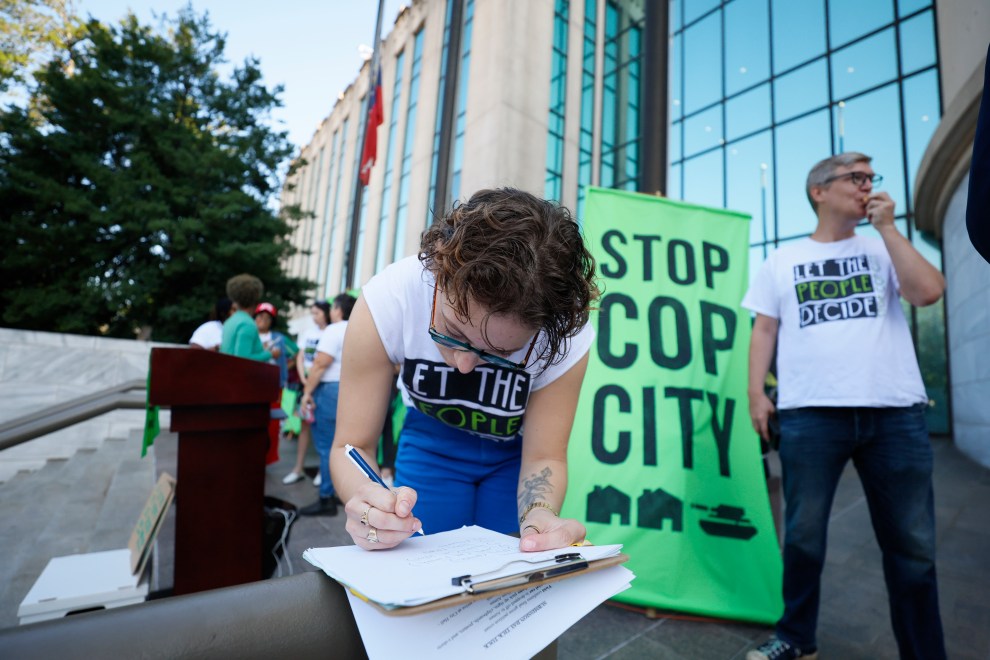
Activists gather outside Atlanta City Hall on September 11, 2023, where they delivered dozens of boxes full of signed petitions to force a referendum on the future of a planned police and firefighter training center.
Miguel Martinez/Atlanta Journal-Constitution/AP
If Chambers’ rhetoric and politics are brash and unapologetic, when he speaks about his early years, he’s different—tortured, bashful, almost self-loathing. “It was very typical—sort of nepo-baby or, like, rich kid journey to find oneself,” he told me during our first phone call.
While the Coxes have shaped Atlanta for generations, Chambers was raised in Brooklyn, where his father felt more at home with the Patagonia-clad upper crust of the Northeast than his family’s Southern opulence. So Chambers’ exposure to Georgia as a child was limited to yearly visits to his grandmother’s house in the tony neighborhood of Buckhead. Her “crazy fancy” home was a showier version of wealth, he recalls, than the brownstones-and-progressive-private-school version in Brooklyn. He recalls thinking of Atlanta as a “weird oasis of ultra-elite people.” Chambers grew to feel uncomfortable around them, in part, he says, because of his troubled life at home. As a teenager, he got into drugs, which led to run-ins with police.
It wasn’t until Chambers was in his 20s—recently married, a Bard College dropout, and “going through a Christian phase”—that he relocated to Atlanta to attempt a conventional life. He moved to the middle-class suburb of Smyrna and took a job training managers at his family’s vehicle auction company, Manheim. By the time he was 25, he had three children. Though his role at the company was decidedly white collar, “I was friends with a lot of regular, truly working-class guys,” he said. “I related to that and wanted to fit into that.” As he told me about this chapter of his life, Chambers seemed eager to head off any accusations of slumming it. “I’m not trying to claim some class identity that I don’t have,” he said. “I’m just talking about the social environments that I’ve been in.”
Working at the plant rubbed him the wrong way—he was unsettled by the power dynamic between the white managers and the mostly Black workers and appalled by the low wages and the “incredibly poor conditions the lowest ranks of workers had.” Then, the 2008 recession hit, and the company laid off thousands of workers, yet “there was still revenue in the billions,” he recalled. “I hated it—I hated the whole thing.”
Disillusioned, Chambers left Georgia later that year. For a few months, he made a half-hearted attempt to finish his degree at Bard but then decided to move his family to Russia, where his wife was born and still had family. Surrounded by a new culture, Chambers became enthralled and dove into learning everything he could about the country and its politics. He decided to try to finish his degree at Bard, returned with his wife to upstate New York, and threw himself into working out and learning more about radical leftist movements.
In 2012, Chambers was summoned to Atlanta for his grandmother’s 90th birthday, and during the trip, he met a guy selling two gyms, one in the city, and one in the Northern suburb of Alpharetta. Impulsively, Chambers bought them and relocated to Atlanta again, commuting between the two gyms. At the Alpharetta location, he remembered that one of his trainers was a “bored, wealthy housewife” who aspired to open a gym. Her name was Marjorie Taylor Greene, now a Republican member of Congress representing Georgia. At that time, Chambers recalled, Greene wanted to become “an important person in the world of CrossFit.” When I asked Rep. Greene’s office about Chambers’ account, a spokesperson responded, “We aren’t participating in any article written by Mother Jones, but for clarity, I can not confirm because it’s not true whatsoever and you should refrain from printing any nonsense about Congresswoman Greene from this avowed Communist.”
Chambers’ first few months back in Atlanta were tumultuous: He got divorced, began using drugs again, became involved with another woman, got sober, married the other woman, and opened a coffee shop in the upscale enclave of Virginia Highland with his new wife. Nearby, in the rapidly gentrifying neighborhood of East Atlanta Village, he opened a new gym, which he advertised as “a radically aligned, left-friendly gym and community.” A posted sign offered something of an ethos: “Do whatever the fuck you want, correctly, except CrossFit cultism. No fucking cops.”
But he was making inroads with the city’s radicals—especially the police abolitionists. In 2014, he traveled to Ferguson, Missouri, to protest the police shooting of Michael Brown. The trip was another turning point—and it coincided with a family transaction that, he said, took his own fortunes from “theoretically wealthy” to “immediately wealthy,” in the “single digit millions of dollars.” But Atlanta, Chambers told me, was “a difficult place to organize, because there was a really strong Democratic Party mechanism there,” he told me. “It just felt like dancing around with these NGOs.” He discovered that several of the racial justice groups he had been working with had ties to the Democrats, so he abandoned the mainstream groups and began to offer direct support to activists.
During the next seven years, Chambers got divorced again and started a commune in the Berkshires, but he stayed in touch with his police abolition friends in Atlanta. In 2021, shortly after Bottoms announced plans for the police facility, Chambers learned of the need for funds to mount a robust protest. He gave generously—first in the tens of thousands, and then in the hundreds. “It was unbelievable to people—in the wake of a pretty strong decade of anti-police sentiment growing especially in Atlanta—that then this would be dropped on the city,” he said. “They were demolishing a forest—that was just totally insane.”
Despite his contributions, it wasn’t easy mobilizing opposition to the facility. Specifically, Chambers saw Atlanta’s Black Democrat centrists—such as former Atlanta Mayor Kasim Reed and Sen. Raphael Warnock—as barriers to progress. “I understand how the Black radical community views them,” Chambers told me. “You know, advancing the white corporate agenda of [Atlanta’s wealthy] North Side.” In 2021, Reed told the Atlanta Journal-Constitution, “I support the development of a best-in-class training facility for our police officers, but I have not made a judgment on where it should be located.” Last year, Sen. Warnock criticized the protesters who destroyed property.
If the protesters were going to win, they needed more people on their side. And if they wanted more people, they needed more money. So, Chambers decided to do something he had been contemplating for a while: Last July, he struck a deal with his family. Instead of inheriting a vast portfolio of investments, he received $250 million and will get more in the coming years—he declined to say how much or exactly when. Some of his money, he said, is in irrevocable trusts, so he can’t personally access it—but it’s designated to go toward the causes he cares about, including protesting the facility in Atlanta. Chambers sees his divestment as an act of protest—against capitalism, yes, but also against his own family’s elitism and greed. “I was ready to let go of whatever illusions I had about doing anything else with myself,” he said, “except trying to be of service to destroying the thing that had created me.”
If Atlanta’s police and political powers have their way, Cop City will be finished by the end of this year. They appear undeterred by the protesters, except for occasional complaints about the inconvenience and expense they’ve caused. In January, city officials said 23 acts of arson had taken place at the site, resulting in a $20 million rise in costs, which they promised would not be passed on to taxpayers.
The leaders of the protests claim that they’ve collected 116,000 signatures, nearly double the number they needed to bring the facility before voters as a ballot initiative. But a December analysis by four Atlanta news outlets found that as many as half of those signatures could be invalid—one signature that they found, for example, was that of “Lord Jesus” with the address of “homeless.” In February, the Atlanta City Council voted to start an official count of the signatures, which will determine the fate of the proposed ballot measure.
On X these days, Chambers is prolific, musing in rapid-fire style about Palestine, the war in Ukraine, his recent conversion to Islam, and, of course, Cop City. On the January anniversary of the killing he posted that because they supported the project, “my family, the Cox family, continues to have Tortuguita’s blood on their hands.”
Recently, he’s also been mocking those who suggest that Democrats must unite behind Biden to defeat Trump. “Why any of you ever put ANY faith in liberals continues to be beyond me,” he posted in January. As he later added, “The Democrat base is about as uncritical as any political bloc, ever…Thank God that base is aging out of relevance.” In Georgia, recent polls predict a Republican victory in the 2024 presidential election.
Bipartisan politics, Cop City, Palestine, Russia—one gets the sense that for Chambers and many of those he supports, these are all a single cause. When I spoke to Franklin, the community organizer whose demonstrations against the facility Chambers has funded, he offered similar context, telling me that his fellow protesters “see Cop City in terms of the connection that police here in the United States have with the Israeli Defense Forces and Israeli policing agency” and “US imperialism driving towards Russia’s border or using Ukraine as a proxy for that.”
But when we spoke, other, more personal issues demanded his immediate attention. When I asked him in December if I could join him at an Atlanta protest event sometime, he told me that would be unlikely; he had moved to Tunisia. “I just needed to take a break,” he told me. “Elements of people who call themselves the left and the state want to come after me.”
I asked him what was next with the protest movement. He didn’t know, he said. “What if there’s a scandal that we don’t know about?” he wondered aloud, hoping that a political curveball could kill the project. But mostly, he just seemed overwhelmed with the magnitude of his recent inheritance. “Nobody’s used to operating with this scale of resources and, like, how to use it strategically—I need to create different trusts and, like, donor-advised funds.” He sighed anxiously. “I don’t understand this shit.”
In March, when we spoke again, he was still in Tunisia; he had gotten married again the previous month, this time to the mother of his fourth child. He told me that the Cop City organizing had slowed, mostly because he is devoting more time and money to Palestine, as are many of the other activists he works with. There are, he said, “definitely murmurings of the FBI looking at me.” Still, he said he plans to keep supporting the protesters and their legal defense, to the tune of still more millions of dollars if necessary. “They’ll have really significant costs that are going to come up because it’s going to be a fairly drawn-out thing,” he said. “I know we’re going do something considerable.”

